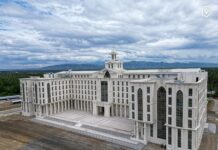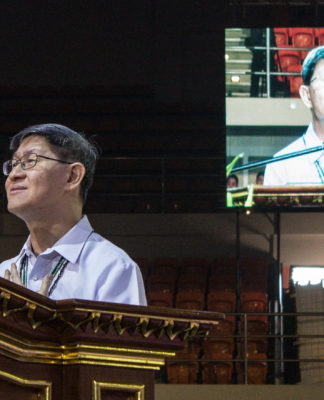THE COMPREHENSIVE Agrarian Reform Program (CARP) is not a thing of the past and should continue, even for a century, because it is the funding – not the program itself – that had expired, a Thomasian alumna said in a forum last month.
“According to the Constitution, (CARP) is a continuing (program under the Comprehensive Agrarian Reform Law). CARP could only be changed through charter change,” Elvie Baladad, a 1973 AB Political Science graduate, said in the forum “Usapang Tomasino 6: Rinepormang Reporma,” last Nov. 28 at the Civil Law Moot Court.
Congress is in the thick of debates to extend the 1988 law implementing the agrarian reform program, which expired last June 10. Farmer groups want a seven-year extension while many lawmakers want it ended because the land redistribution scheme has largely failed.
“This is the usual ideology of other Filipinos because this is what is often said in the media. This is absolutely untrue. You do not re-enact an existing law, you can only amend it. CARP will go on even after 100 years, unless the Constitution is changed,” said Baladad, who leads a farmers’ group.
The Comprehensive Agrarian Reform Law, enacted in 1988 in the aftermath of the massacre of 13 farmers at Mendiola bridge near Malacañang on June 22, 1987, aims to distribute land and extend financial assistance to farmers, freeing them from their landlords.
Moreover, Baladad said that “if Filipinos no longer care about CARP, then they might as well forget (about) eating, for every natural resource used to make products depend on the farmers’ harvest.”
Kilusang Magbubukid ng Pilipinas leader Jaime “Ka Jimmy” Tadeo echoed Baladad’s statements, saying that the Philippine market, in fact, is mobilized by farmers.
“The markets generate income because of the farmers. If there would be no harvests, what would they sell, then?” he said. “Raw materials make up our food.”
Land for peace
Tadeo said the equal distribution of lands could eventually solve major social problems, such as the communist rebellion.
“Where did these problems start? (They were) mostly because of land ownership, because rich Filipino families tend to greed over land and leave nothing for the farmers,” he said. “If everyone is entitled to his own land, I do not think any NPA member would still want to live in the woods and fight the government.”
The Bible orders men to “serve as stewards of the God-given lands which shall be divided equally according to one’s needs,” he added.
“If what you have has already exceeded what you need, you must give it to others who are less fortunate,” Tadeo said. “Many politicians do not approve this because their lands will be taken away from them, to be distributed to farmers.”
Last Dec. 3, Baladad and Tadeo led over a thousand farmers who had walked from Bukidnon all the way to the Department of Agrarian Reform on Elliptical Road, Quezon City to call for the extension of the agrarian reform law.



















